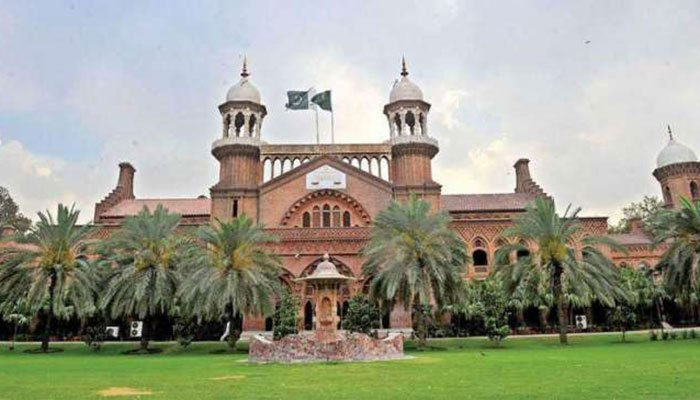Constitution not suspended during emergency…: What’s basis for treason case, asks LHC
Justice Mazahar Naqvi remarked that martial law was imposed on Oct 12, 1999, which was not mentioned in the case. Imposing emergency was another thing, and suspending the Constitution was something different, added the judge.
LAHORE: Justice Sayyed Mazahar Ali Akbar Naqvi of the Lahore High Court (LHC) remarked on Tuesday that suspension of the Constitution formed the basis for registration of a treason case. If the suspension of Constitution happened in November 2007, asked the judge while hearing a petition, filed by former president, Gen (retd) Pervez Musharraf, challenging the formation and proceedings of a special court in high treason case against him.
Justice Mazahar Naqvi remarked that martial law was imposed on Oct 12, 1999, which was not mentioned in the case. Imposing emergency was another thing, and suspending the Constitution was something different, added the judge. If the Constitution was not suspended during emergency, then how a treason case was registered, remarked the LHC judge.
Earlier, the federal government filed a reply in the LHC in the Musharraf petition against treason case against him. However, the bench again directed the federal government to present complete record of treason case against Gen Musharraf till Dec 10.
As the hearing commenced, representatives of Law and Interior ministries appeared before the court and stated that the treason case record could not be produced as it was lying with the Islamabad High Court (IHC) in connection with the proceedings conducted by a full bench. At this stage, the court inquired about the presence of attorney general for Pakistan. A federal law officer replied that the attorney general did not turn up due to non-availability of the record.
He submitted that as soon as the record would be procured from the IHC, the attorney general would appear before the court for assistance.
However, Musharraf counsel Advocate Muhammad Azhar Siddique raised two preliminary objections over the ongoing high treason proceedings against Musharraf. He stated the complaint was filed with mala fide intention as it appeared from the notification that the direction was passed by the then prime minister, who was directly aggrieved by the act of the petitioner in the instant case, to the Interior ministry for initiation of the proceedings.
He submitted that the complaint was filed without approval of the cabinet, which itself was in defiance of the guidelines, set by the Supreme Court in Mustafa Impex case. He said that legal formalities contained in Article 10-A were not followed, which was not only against the dictum of due process of law but also basic principles of natural justice.
He argued that the proceedings carried out in pursuance of the complaint were also a violation of Section 4, 5 and 11 of the Criminal Law Amendment Act 1976. Citing in Maulvi Iqbal Haider case, he pointed out that the Supreme Court had not passed any direction that the proceedings should be carried out by prime minister. The court deferred hearing till Dec 10 and directed the law officer to ensure production of case record on the next date of hearing.
-
 Kate Middleton, Prince William Break Silence Over Tragic Shooting In Canada
Kate Middleton, Prince William Break Silence Over Tragic Shooting In Canada -
 'Finding Her Edge' Star Madelyn Keys Explains Adriana's Remarks About Brayden Romance
'Finding Her Edge' Star Madelyn Keys Explains Adriana's Remarks About Brayden Romance -
 Royal Expert Raises Questions Over Sarah Ferguson's 'plotting' Stunning Comeback
Royal Expert Raises Questions Over Sarah Ferguson's 'plotting' Stunning Comeback -
 Instagram Develops AI ‘Create My Likeness’ Tool To Generate Personalised Photos And Videos
Instagram Develops AI ‘Create My Likeness’ Tool To Generate Personalised Photos And Videos -
 Meghan Markle, Prince Harry Friends Suggest Their Marriage 'isn't All It Seems'
Meghan Markle, Prince Harry Friends Suggest Their Marriage 'isn't All It Seems' -
 Andrew Handed Out 'classified' Information To Jeffrey Epstein
Andrew Handed Out 'classified' Information To Jeffrey Epstein -
 Margot Robbie Recalls Wild Party Days And Getting Kicked Out Of Clubs
Margot Robbie Recalls Wild Party Days And Getting Kicked Out Of Clubs -
 NASA's Hubble Space Telescope Discovers ‘Dracula Disk', 40 Times Bigger Than Solar System
NASA's Hubble Space Telescope Discovers ‘Dracula Disk', 40 Times Bigger Than Solar System -
 Annular Solar Eclipse 2026: Where And How To Watch ‘ring Of Fire’
Annular Solar Eclipse 2026: Where And How To Watch ‘ring Of Fire’ -
 Zayn Malik Explains Past Comments About Not Being In Love With Gigi Hadid
Zayn Malik Explains Past Comments About Not Being In Love With Gigi Hadid -
 Internet Reacts To 10 Days Flight Ban Over El Paso
Internet Reacts To 10 Days Flight Ban Over El Paso -
 YouTube Music Tests AI-powered ‘Your Week’ Recap To Summarise Listening Habits
YouTube Music Tests AI-powered ‘Your Week’ Recap To Summarise Listening Habits -
 Kelly Clarkson Ready To Date After Talk Show Exit?
Kelly Clarkson Ready To Date After Talk Show Exit? -
 Is AI Heading Into Dangerous Territory? Experts Warn Of Alarming New Trends
Is AI Heading Into Dangerous Territory? Experts Warn Of Alarming New Trends -
 Google Updates Search Tools To Simplify Removal Of Non-consensual Explicit Images
Google Updates Search Tools To Simplify Removal Of Non-consensual Explicit Images -
 Chilling Details Emerge On Jeffrey Epstein’s Parties: Satanic Rights Were Held & People Died In Rough Intimacy
Chilling Details Emerge On Jeffrey Epstein’s Parties: Satanic Rights Were Held & People Died In Rough Intimacy




